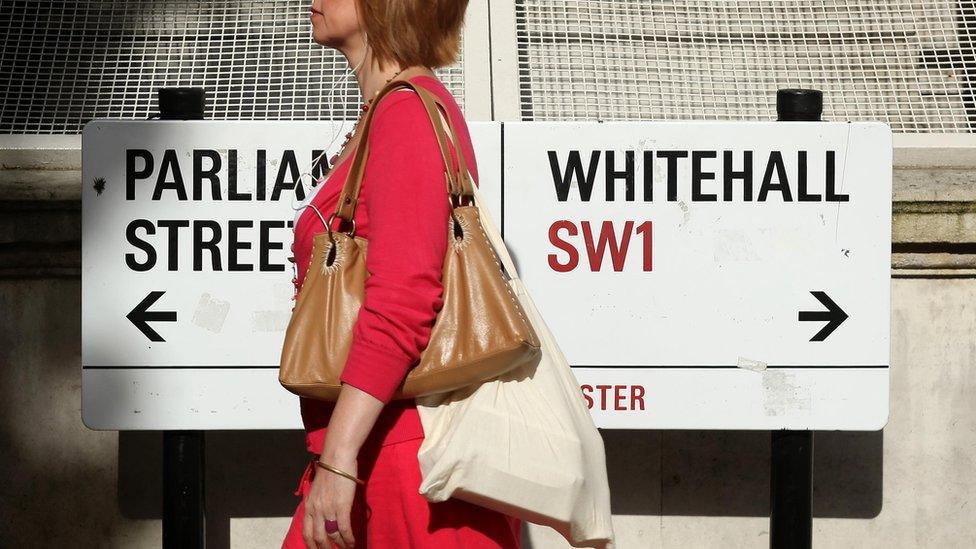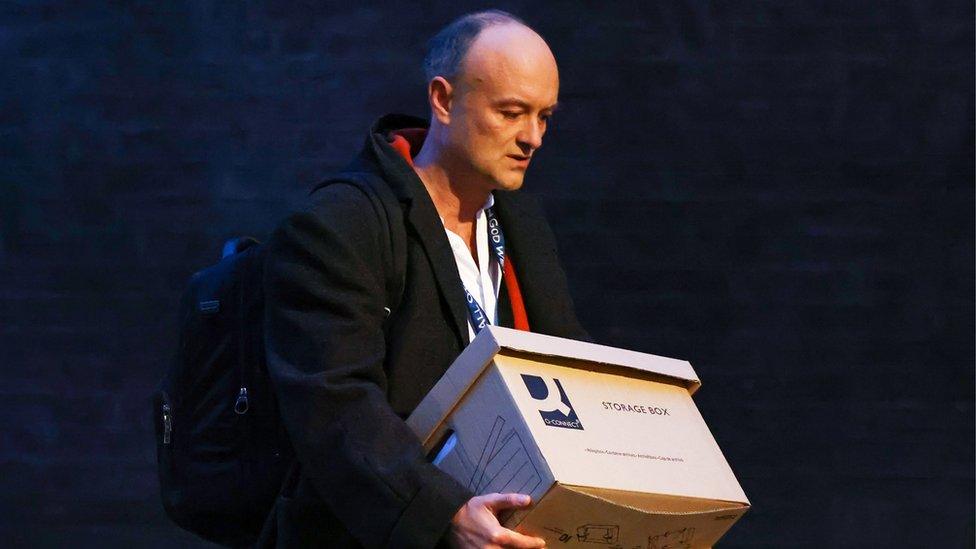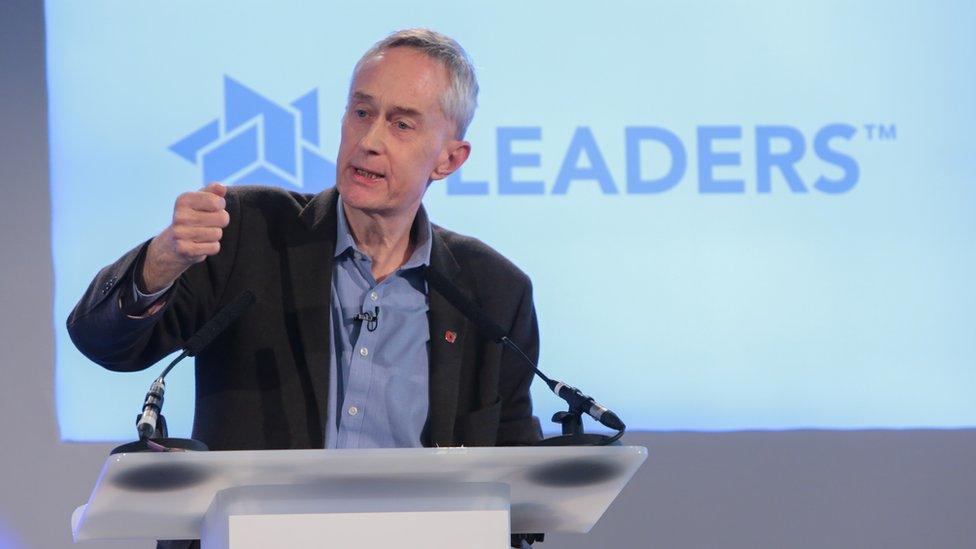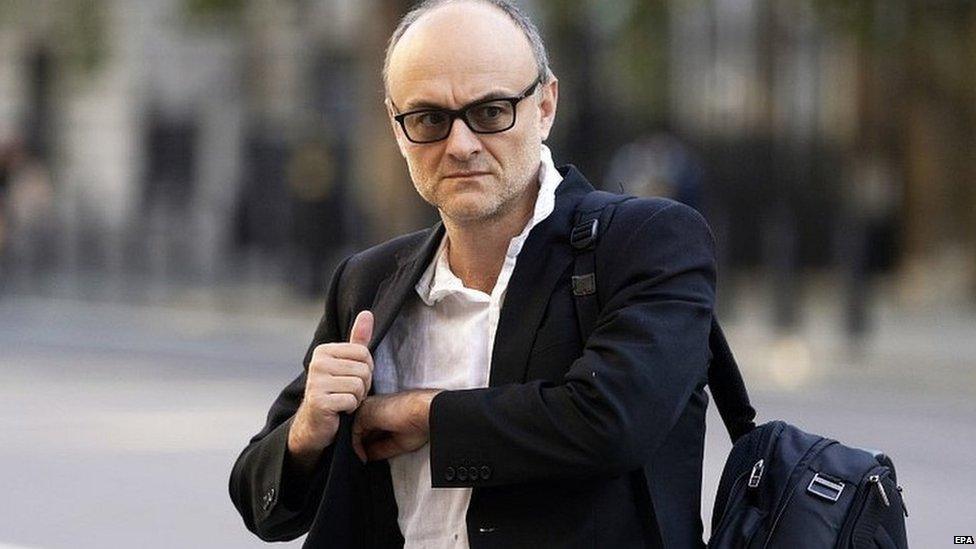PM's latest hire signals desire for Whitehall reform
- Published

If you are not interested in Whitehall intrigue, look away now.
But if you do care about how decisions are being made on all our behalf, something rather interesting happened today.
It emerged in a relatively low-key announcement from Downing Street as part of the daily briefing, which these days is a long-winded conference call with dozens of people frantically reminding each other on Whatsapp to 'mute' while the scratchy call progresses through sometimes barely audible exchanges.
It is not yet the snazzy US-style televised press briefings that No 10 once hoped for, which have now been delayed on several occasions, with whispers around that those delays could go on for some time.
The prime minister told the cabinet this morning, and Downing Street announced at lunchtime, that Sir Michael Barber would be returning to government for a while to carry out a review (one of every government's favourite words) in the next few months of what works, and what doesn't, in Whitehall.
In a letter to cabinet ministers and top officials in SW1, Boris Johnson and his most senior civil servant, Simon Case, wrote:
"This government has an ambitious set of goals for this Parliament and we must ensure we are in the very best shape to deliver them.
"We have therefore asked Sir Michael Barber and a small team to conduct a rapid review of the arrangements for driving and monitoring delivery both at the centre of government and in departments, and to suggest to us how they could be strengthened."
The prime minister has made no secret of his frustration with how some of the government machine responded, or rather struggled to respond, in the early stages of the Covid-19 pandemic.
Government figures argue strongly that there are many things that have worked: the benefits system, the furlough scheme, and of course now the provision of vaccines.
But particularly in the early months, it was common to hear ministers wonder aloud whether the supposed Rolls-Royce of the UK civil service was a less reliable and sophisticated engine after all.
Doing things differently
That made the case, Boris Johnson's supporters used to argue, for up front, forceful changes to Whitehall - and if shaking things up knocked some plaster off the ceiling, well so be it.
The push for new ways of working was led by Dominic Cummings, the PM's pugnacious former adviser, who could pick a political argument in an empty room and championed the notion of taking on the establishment at every turn.
Some were less than revolutionary, such as getting experts from different departments to work together more.
Others were a lot more confrontational, such as clearing out what seemed almost a whole generation of permanent secretaries.
For the government he helped create, led by an old Etonian former Telegraph columnist who had previously been foreign secretary, that narrative was not exactly without irony, but there is no question that he wanted to do things differently.

Dominic Cummings left Downing Street last year after internal battles over his role.
Since Mr Cummings's departure however, the government's appetite for reform has rather faded. One senior figure joked to me a few weeks ago the word "reform with a capital R had been banned".
There is still an official agenda to make changes to the civil service, moving officials out of London for example.
But if the prime minister's appointment of a chief of staff with a Treasury and banking pedigree, Dan Rosenfield, suggested that Downing Street would be run in a rather more conventional way, today's appointment is a sure sign that the era of Mr Cummings's "hard rain" is over.
For Sir Michael's track record is crammed with previous Whitehall appointments.
An education expert, most recently in charge of the higher education regulator, he came to prominence as the head of Tony Blair's Delivery Unit, which pushed forward New Labour's reforms in the early 2000s.
Since then, he has been a non-executive director of a government department, carried out a review of getting value for taxpayers' money for Philip Hammond when he was chancellor and built up a business, writing books and advising governments how to get things done all round the world, even, according to his company's website, trademarking the notion of "Deliverology".

Sir Michael - pictured here in 2016 - has extensive experience in Whitehall.
He has plenty of fans in senior jobs in government, and the pick is being seen as a way to get the machine in better shape - not just to get through to the other side of this crisis, but to be ready to get other things done effectively, and crucially, to be able to show voters that ministers are keeping the manifesto promises they made.
While there are plenty around SW1 applauding the appointment, one insider groaned that it was "back to the future," wondering if Tony Blair's policy enforcer could be the right person now.
Another senior official suggested that while Cummings and Barber were completely different characters, they both advocate (with varying degrees of success) a central focus on data and evidence to build a powerful machine slap bang in the centre of the government.
It's understood Sir Michael is going into No 10 with an "open brief".
But one insider questioned whether his trademarked approach of "deliverology" would recommend anything other than a very centralised approach. Another senior Whitehall official joked that this was just the latest ruse to try to solve "the classic Whitehall problem - 'the centre' thinks it's very powerful, departments know it's not".
British governments' bookshelves are overloaded with reviews and it could well be that Sir Michael's, to be completed through a contract with his company, Delivery Associates, a source suggests, ends up sitting on there alongside many others - their earnest recommendations read, then largely ignored.
But hiring him is a sign of an intention - that Boris Johnson's team wants to find ways of doing things better after the turmoil of the Covid pandemic, and it's confirmation too that the era of asking "weirdos and misfits" to help shake down Whitehall is done.
Related topics
- Published27 September 2020

- Published26 November 2020
